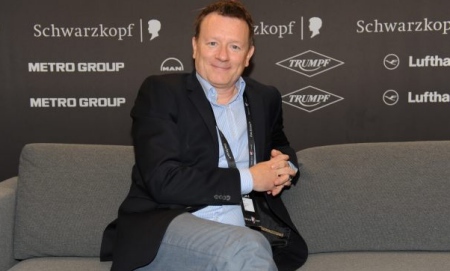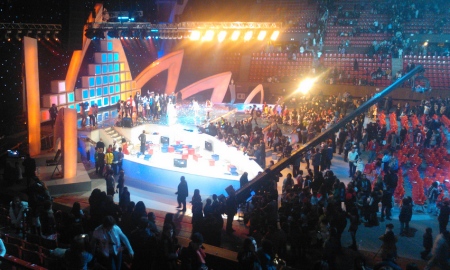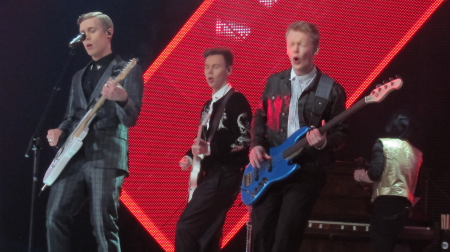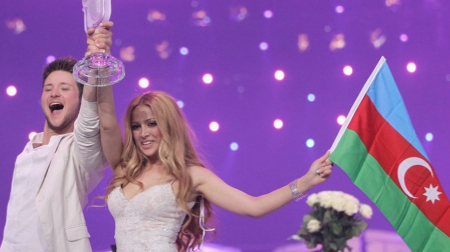After today’s release of the jury names for the 2014 Eurovision Song Contest, ESC Insight’s Ben Robertson does some in-depth analysis on the list for some trends, numbers, and things to watch out for in the voting in this year’s Song Contest.
As the Eurovision month of May dawned, the names, data and short biographies of each of the 5 Eurovision jury members were made public on the official website (PDF Link). The list reveals many familiar names; including Eurovision winners, composers, and performers from years gone by; as well as veterans from various disciplines in the music industry.
This is new for the Song Contest. In recent years, jury members were kept secret until the transmission of the Grand Final. Thanks to the EBU’s new-found love of ‘increased openness’, these jury members will have not just their names known to the world before the contest, but also will have their individual points, from first place to last place, published shortly after the final result is declared.

Jon Ola Sand (Alain Douit, EBU)
Ladies And Gentlemen Of The Jury
A ‘balance of gender’ is one thing that the jury members of each country should include as requested by the European Broadcasting Union, and the organisation is very open and seemingly proud that the jury breakdown is composed of 79 females and 106 males.
While impressive for overall balance, remember that this is the culmination of each country finding their best five jury members possible. If we break this down per country we find the following information.
5 male jurors – 0 female jurors: None.
4 male jurors – 1 female juror: Two (Macedonia and Montenegro).
3 male jurors – 2 female jurors: Twenty-eight.
2 male jurors – 3 female jurors: Seven (Denmark, Finland, Georgia, Iceland, Portugal, Ukraine, UK).
1 male juror – 4 female jurors: None.
0 male jurors – 5 female jurors: None.
While we will refrain from entering the extended debate about gender equality, we will note that 30 of the 37 jury groups are majority male. Yes, the juries of the 3-2 split are ‘balanced,’ but to see so many leaning to the male side of the coin shows the system has not created a balance across the entire show. The two groups from Macedonia and Montenegro obviously stand out for the lack of gender balance that has been achieved in these countries.
The Professions Of The Jury Members
The jury members all have to be ‘music professionals.’ Our interpretation of this is therefore that they are people who are employed to work in the music industry. They could be performers or journalists, musicians, songwriters and many more in-between.
Some names from the list stand out as not fitting this criteria fully. Arman Davytan is best known in Eurovision circles for designing the trophy for Junior Eurovision 2011 when the contest was in Yerevan. Digging around has uncovered numerous articles about his design work, but little to suggest a musical career. Does Arman have the qualities to be on our expert jury groups?
Nevertheless, he is not alone for having an unorthodox background compared to the EBU’s criteria for jury duty..

The end of Junior Eurovision 2011 (Picture: Ewan Spence)
Alexander Mezhenny and Sasha Jean-Baptiste are on the juries for Belarus and Sweden respectively. Both list their experience as being dancers and choreographers. While playing a role in the music industry, being asked to comment on vocal capacity and composition does not appear to be part of their day to day working life.
Dafna Gold on the Israeli jury has a biography telling us that she is now a physics student at the University of Tel Aviv, in addition to being a clarinetto player and ballet dancer.
Inna Adamovich sits on the Belarussian jury. Her role involves, her biography says, the organisation of competitions and festivals in Belarus. She is also the Head of the Ministry of Culture for Belarus – Jon Ola Sand is on record as saying that “we should keep politics out of the Contest.”
This is a far cry from the musicians, songwriters and artists that many expected when the juries were re-introduced in 2009
Sign Here, Please!
And then you have the major record labels. While they are clearly jurors who are part of the music industry, they also naturally have a connection to a number of artists taking place in this year’s Song Contest. If an artist is signed to the same label as a juror, there is a connection which must be taken into account.
Marcus Van Lier is the chairperson for the Swiss jury, and is the Managing Director of Warner Music Switzerland. Both Twin Twin (France) and Molly (United Kingdom) are signed to Warner.
Patrick Hughes is Sony’s General Manager in Ireland is the Chairperson of RTE’s Irish Jury, while Sony Austria’s division head Dietmar Lienbacher is on ORF’s jury. Softengine and Conchita Wurst are signed to Sony, and both perform in the second semi-final, alongside Ireland and Austria.

Finnish rock band Softengine (picture: Ewan Spence)
Singers Dominate The Jury Groups
The real interest in the professions of the members of juries will come later, when their results are revealed. Will we see trends in voting patterns between singers and songwriters and so on? Will we find that singers vote for technically good singing more than songwriters, or radio hosts? Are radio show producers looking more for songs that are chart friendly? For now, we can see that many more of the professional jury members are famous as singers rather than songwriters or other parts of the industry.
In a brief rundown of the job descriptions from what the EBU have provided us, the largest group of jury members, 69, are defined as a singer or an artist (37%). This far and away trumps the 34 songwriters and composers (18%), the 21 music producers (11%), the 15 musicians (8%) and the 11 music journalists (6%).
As a starting point we would expect singers to be looking for vocal capacity as a stronger focus criteria, and the songwriters for the original composition skill from the song itself. Strong vocals may be even more in the spotlight than first thought.
The Age-Old Problem
The juries are also meant to provide a good balance of age as well to try and make the votes as representative as possible. However the average ages for the juries range from a 25.6 average age in San Marino to a 49.4 range in Albania (and interestingly the youngest Albanian juror is older than the oldest German juror).
Germany also has a youthful jury average under 30 years old, with no one above 35, whereas Ukraine and Poland have averages that are above 48. Like with the ratio of males to females, we do not have a perfect balance in the jury breakdowns. This is of course a difficult skill with just five-jury members to consider. Again, at the moment we do not have the statistics to know if trends do exists that younger jury members vote for more youthful songs and poppier songs, or if older members will vote for those songs of a more classical style. It is a hypothesis worth testing.
San Marino’s youthful jury will deliver a 100% jury vote as they are not able to meet televoting thresholds due to the lack of a separate phone network. Given their strong voting relationship with Greece would see us expect this to do very well with San Marino. Equally Sweden, with two young singers from Melodifestivalen this year, the playlist organiser of youth station P3, the head of music from commercial Rix FM, and dancer Sasha is likely to ‘vote youth’ – if such a thing exists.
Similarly will an older Albanian jury favour the smoother sounds of northerly Montenegro instead of those from Greece to the south?
Another Type Of Political Voting
One nature of the votes being made public is that now not only can we see what happens when a country does give points to a song, but we can see for each individual person which song they put last as well. With political pressures across Europe, we take a few examples to see what to expect.
As Paul Jordan as written on ESC Insight, the Russian-Ukrainian conflict is having this Eurovision as one of the first shared world stages for the two countries since the Crimean invasion. Much speculation from fans suggests that juries on the Ukrainian side would be pressured not to vote for Russia. These five individuals, whatever side of the argument they are on, have a very difficult job to do in being able to justify their points on a purely musical level when the conflict is so tense. Similar discussions can also exist for the relationships between, for example, Azerbaijan and Armenia.
The analysis from fans will of course take place after the contest with each of these votes at a level never before possible with the Eurovision Song Contest.

Nikki (r) returns to the Song Contest on the Azeri jury
What Does This All Mean For Our Song Contest?
By increasing openness, we also increase the scrutiny on each of the points given. The juries have their criteria, which provide to guide your votes in the song contest. By revealing their points we believe that some jury members could ‘play safe’ and vote for acts that have a professional feel to them (and won’t have them laughed out of the office on Monday morning). That we can scrutinise through the jury members list and in a few minutes find names that don’t seem to fit and have possible flaws is… interesting.
That we can see wide differences in the jury groups between gender, age and background means that for each delegation getting the balance right in their five-person jury group has been a task too far.
In terms of our expectations from this year, we note that there are a significant number of singers on the juries, which we would expect to suggest the vocal capacity is extra important to any chances of success. Equally a significant minority of jury members are made from commercial radio stations, suggesting a good hit potential vibe would also be a factor to look for in voting this year.
Once the results from the juries are announced for 2014 we can start to build up a model on what juries are actually looking for and reacting to in the Song Contest, which could potentially help create a better jury system for the good of the Contest in the following years.









Sido on the German jury was on the panel of Die grosse Chance 2011, which Conchita appeared on. Though apparently he hated her…
Agreed, Ben. I wonder how more connections like this are out there?
Great read! Will be very interesting to see the breakdown of results this year. Will Russia increase hostile resentment if Ukraine juries don’t give them the high points they always strive for I wonder.
The most *interesting* ones for me were Oscar Zia (whose musical contributions to the world include the illustrious “#fail” song) and Iris for Belgium, whose vocals, as we all know, were a bit… yeah. Still, I’m sure they’ll provide a more youthful opinion in contrast to the more experienced jury members from Albania etc. that you mentioned. It will be really interesting to see the breakdown of each individual’s votes, and see if your hypothesis is indeed correct. 🙂
I think the analyse of the jury vote, this year, could contribute to long range of articles, which will take us to ESC in 2015:) The amount of material source will, no doubt, increase debate on voting in Eurovision and will made punters think and in the way, get confuses.
very confused.
The good thing for the Ukrainian jurors is that it’s easily justifiable to put Russia a notch (;)) below top ten. While I like the song, it doesn’t have a lot to offer in regards to musical merit. Azerbaijan and Armenia would have a more difficult task trying to explain voting each other down, only nobody is really expecting anything else, so who’s seriously gonna ask?
I was surprised to see Iris in the Belgian jury, because she has already given her vote, representing Belgium in the Eurojury poll: https://eurovoix.com/2014/04/28/eurojury-belgium-calling/ Is it okay for a jury member to state their favourites publicly in advance? Kind of weird, somehow …
And the German jury was already terribly young last year. It seems that NDR are really trying to make the contest more popular with younger viewers, and they’re trying really hard (too hard maybe). But then again, making Helene Fischer the spokesperson for the votes is the exact opposite. Again, kind of weird.